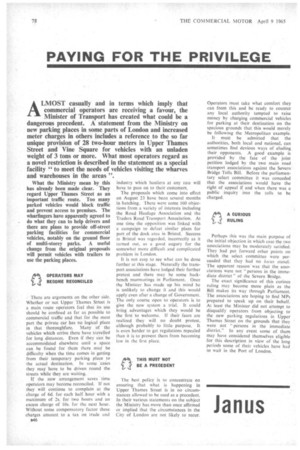PAYING FOR THE PRIVILEGE
Page 80

If you've noticed an error in this article please click here to report it so we can fix it.
ALMOST casually and in terms which imply that commercial operators are receiving a favour, the Minister of Transport has created what could be a dangerous precedent. A statement from the Ministry on new parking places in some parts of London and increased meter charges in others includes a reference to the so far unique provision of 28 two-hour meters in Upper Thames Street and Vine Square for vehicles with an unladen weight of 3 tons or more. What most operators regard as a novel restriction is described in the statement as a special facility "to meet the needs of vehicles visiting the wharves and warehouses in the areas ".
What the Ministry mean by this has already been made clear. They regard Upper Thames Street as an important traffic route. Too many parked vehicles would block traffic and prevent access to premises. The wharfingers have apparently agreed to do what they can to help drivers and there are plans to provide off-street parking facilities for commercial vehicles, notably on the ground floor of multi-storey parks. A useful change from the original proposals will permit vehicles with trailers to use the parking places.
OPERATORS MAY BECOME RECONCILED There are arguments on the other side. Whether or not Upper Thames Street is a main route operators feel that its use should be 'confined as far as possible to commercial traffic and that for the most part the private car has no logical place in that thoroughfare. Many of the vehicles which arrive there have travelled for long distances. Even if they can be accommodated elsewhere until a space can he found for them there maY be difficulty when the time comes• in getting from their temporary parking place to 'the actual destination. In some "cases they may have to be driven round the streets while they are waiting.
If the new arrangement saves time operators may become reconciled. If not they will continue to complain at the charge of 6d. for each half hour with a maximum of 2s. for two hours and an excess charge of 10s. for the next hour. Without some compensatory factor these charges amount to a tax on trade and 946 industry which hauliers at any rate will have to pass on to their customers,
The proposals which come into effect on August 23 have been several months in hatching. There were some 160 objections from a variety of interests including the Road Haulage Association and the Traders Road Transport Association. At one time the opposition was linked with a campaign to defeat similar plans for part of the dock area in Bristol. Success in Bristol was regarded, incorrectly as it turned out, a S a good augury for the somewhat more difficult and complicated problem in London.
It is not easy to see what can be done further at this stage. Naturally the transport associations have lodged their further protest and there may be some backbench murmurings in Parliament. Once the Minister has made up his mind he is unlikely to change it and this would apply even after a change of Government. The only course open to operators is to give the new system a trial. It could bring advantages which they would be the first to welcome. If their fears are realized they will no doubt protest, although probably to little purpose. It is even harder to get regulations repealed than it is to prevent them from becoming Jaw in the first place.
ciTHIS MUST NOT BE A PRECEDENT The best policy is to concentrate on ensuring that what is happening in Upper Thames Street is in no circumstances allowed to be used as a precedent. In their various statements on the subject the Ministry has more than once affirmed or implied that the circumstances in the City of London are not likely to recur. Operators must take what comfort they can from this and be ready to counter any local authority tempted to raise money by charging commercial vehicles for parking at their destination on the specious grounds that this would merely be following the Metropolitan example. It must be admitted that the authorities, both local and national, can sometimes find devious ways of eluding their opponents. A good example is provided by the fate of the joint petition lodged by the two main road transport associations against the Severn Bridge Tolls Bill. Before the parliamentary select committee it was conceded that the associations would have the right of appeal if and when there was a public inquiry into the tolls to be charged.
A CURIOUS RULING
Perhaps this was the main purpose of the initial objection in which case the two associations may be moderately satisfied. They had put forward other points on which the select committee were persuaded that they had no locus standi. The apparent reason was that the associations were not "persons in the immediate district" of the Severn Bridge.
The exact significance of this curious ruling may become more plain as the Bill .makes its way through Parliament. The associations are hoping to find MPs prepared to speak up on their behalf. At least the Minister did not attempt to disqualify operators from objecting to the new parking regulations in Upper Thames Street on the grounds that they were not "persons in the immediate district." In any event some of them may have considered themselves eligible for this description in view of the long periods some of their vehicles have had to wait in the Port of London.
Janus




































































































































